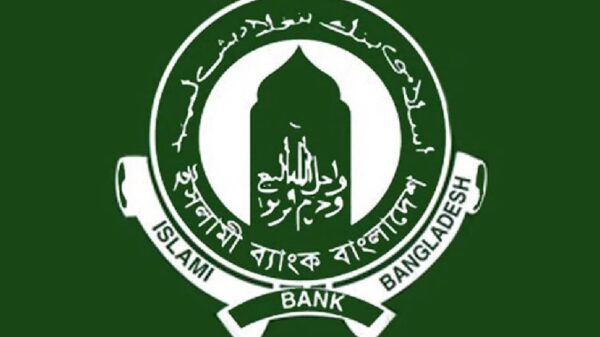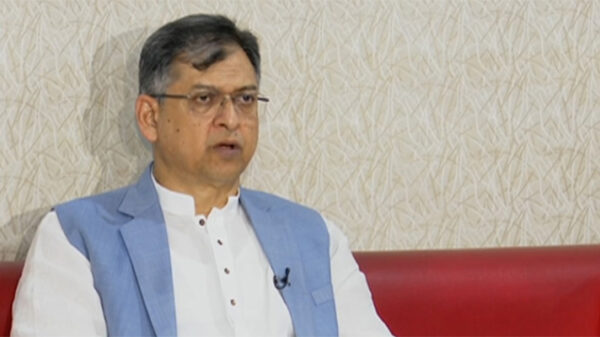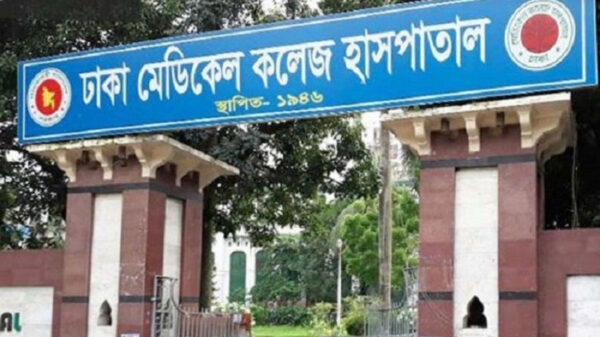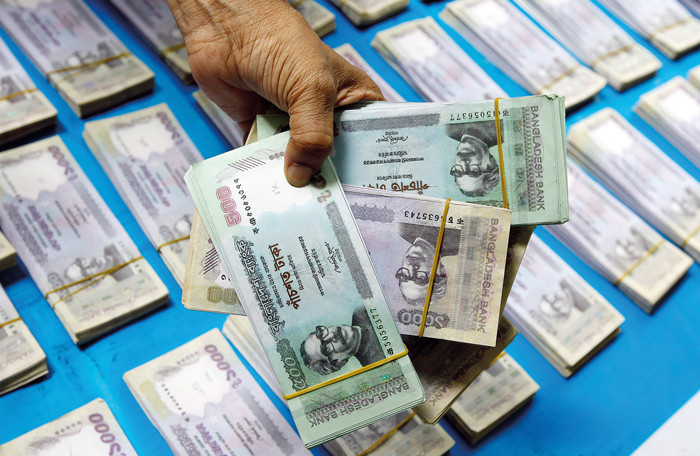Staff Reporter:
Even though Bangladesh’s banking sector is facing a liquidity crunch, there has been a surge in deposits recently.
The flow of money in the banking sector has decreased significantly, as in the last nine months, there has been a decrease of Tk63,000 crore in liquidity.
Bangladesh Bank said that more money has been withdrawn from the bank recently than has been deposited.
Generally, the growth of bank deposits is higher than that of loans, but recently this situation has reversed.
According to the central bank’s latest report, deposits increased by 1.14% in the nine months from July to March of the current financial year. In contrast, loans increased by 6.7% during the same period.
These numbers indicate that loans have increased by 5.56% more than deposits.
In this regard, Brac Bank Chairman and Policy Research Institute of Bangladesh Executive Director Dr Ahsan H Mansur said the rise in deposits alone will not have any impact on loan distribution.
If the decline in deposits persists, banks may decrease their lending activities, he noted.
He also said that Bangladesh Bank is selling dollars to commercial banks at the rate of Tk104.50 every day. As a result, money has gone from the market to Bangladesh Bank.
On the other hand, the conversion of taka to dollars and its subsequent discharge abroad has led to a liquidity crisis within the banking sector, Mansur noted.
He further pointed out that there are several risks associated with reduced liquidity. The government has already given assistance of Tk24,000 crore to Islami Bank alone to protect it from this risk, he added.
According to Bangladesh Bank data, at the end of June last year, the liquidity in the banks was Tk4,41,681 crore.
Later, at the end of March this year, liquidity decreased to Tk3,79,000 crore, which is 14.25%.
The liquidity in the banking sector rose to a maximum of Tk4,50,000 crore in June 2021 during the Covid-19 pandemic, and till June 2022, the liquidity went through fluctuations.
The downward trend started in June last year and is still continuing.
Reasons behind liquidity crisis
The report also identified six reasons for the decline in liquidity in the bank sector.
These include an increase in the demand for loans following the Covid-19 pandemic, additional spending on imported goods due to inflation in the international market, a growing trend of withdrawing cash from banks, a drop in deposits, reduced income from exports and remittances, and depreciation of the local currency against the dollar.
Meanwhile, to protect the attraction of the depositors and to reduce the banks’ risk, a part of the total deposits has to be kept as a statutory deposit with Bangladesh Bank.
Of this, the general banks have to keep 17% of the total deposits, while Islamic banks have to keep about 10%.
According to the report, in June 2021, the liquidity in the banks was Tk4,50,000 crore.
In June last year, the liquidity in banks was Tk4,41,681 crore. In July it decreased to Tk4,22,000 crore. In August it further decreased to Tk4,18,000 crore. In September it further decreased to Tk4,16,000 crore.
Later in October, it decreased to Tk4,15,000 crore. In November, it went down to Tk4,00,000 crore and in December, it further dropped to Tk3,98,000 crore.
In January this year, the liquidity further decreased to Tk3,86,000 crore. In February, it was Tk3,82,000 crores. In March, the liquidity stood at Tk3,79,000 crores.
Increase in deposits
Despite the decrease in liquidity, deposits increased by Tk1,06,615 crore last year.
Compared to January, deposits have increased by Tk15,000 crore in February alone, according to the latest report of Bangladesh Bank.
In March 2023, the total deposits in the banking sector stood at Tk15,23,991 crore, which was Tk14,17,219 crore in March 2022. This means deposits increased by 7.53%.
According to Bangladesh Bank data, deposits in the banking sector increased by Tk18,000 crore in March. Deposits increased by Tk17,000 crore in February.
In February, the amount of deposits in the bank sector was Tk15,05,000 crore. At the end of March, it stood at Tk15,23,000 crore.
Analysts believe that people are once again returning to banks to save money due to rising interest rates and a lack of alternatives.
In this regard, bank officials said commercial banks have increased the interest rates for customer deposits for several months.
According to Bangladesh Bank, in May 2021, when the annual deposit growth was about 14.5%, and it fell to 5.5% in December last year.
Previously, banks could not increase the interest rate at their will, but now they have that freedom.
In April 2020, as per the directive of Bangladesh Bank, there was an obligation to keep the loan interest rate at 9% and the deposit interest rate at 6%.
Banks have raised interest rates to compete for deposits after the cap was lifted in the latest monetary policy. Now some banks are offering up to 8% interest to customers, whereas the average interest rate last December was just over 4%.
In this regard, Dr Salehuddin Ahmed, former governor of Bangladesh Bank, noted that the interest rate in the banks had been low for some time, and there had been a crisis of confidence for several reasons.
“Many have taken their money out from banks and bought land, flats and luxury goods. But now the deposit interest rate is increasing. Because of this, deposits in the banking sector are also increasing,” he added.
Reasons behind increase in deposits
Apart from the increase in interest rates, bankers are citing three other reasons behind the increase in deposits.
According to them, the mistrust that was created among the customers after the Islami Bank incident has now been resolved.
People are returning to banks as they have no other investment option. Along with this, banks are following a slow lending policy to overcome the liquidity crisis.
In this situation, 17 banks in Bangladesh have distributed additional loans by breaking the balance order of deposits and loans.
Due to this, some Shariah-listed banks are not able to maintain their advance deposit ratio (ADR) despite taking liquidity support from the central bank.
According to the rules of Bangladesh Bank, conventional banks can give loans up to Tk87 for every Tk100 deposited. But 17 banks have disbursed loans exceeding the limit set by them.
The central bank’s report states that in January, the ADR of conventional National Bank Limited was 98.23%, AB Bank Limited’s 96.64% (103.45% of the bank’s Shariah window), state-owned Basic Bank Limited’s 91.17% and One Bank Limited’s 89%.
Shariah-based Exim Bank Limited’s ADR was 100.28%, Standard Bank Limited’s 96.28%, Premier Bank’s (Islamic window) 155.09% and Bangladesh Commerce Bank’s (Islamic window) was 136.26%.
Apart from this, the ADR of five other Shariah-based banks was between 93.01% and 104.54%.
National Bank of Pakistan’s foreign sector ADR is 87.52%. Besides, Community Bank’s ADR is 88.28%, NRB Bank’s 88.05% and IFIC Bank’s ADR is 87.48%.










































